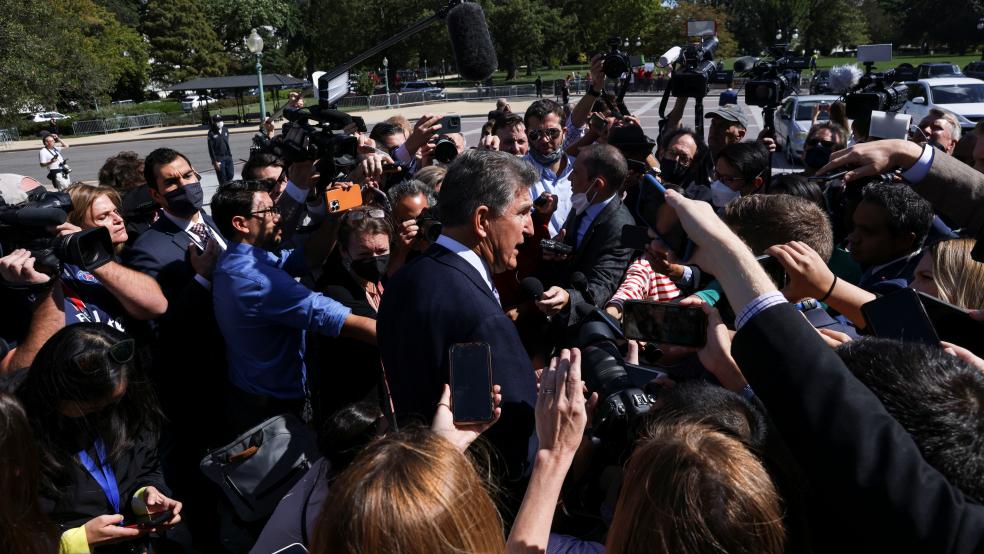Will they or won’t they? It’s still not clear whether Democrats will vote tonight on a $1 trillion bipartisan infrastructure bill. Progressives are still threatening to block the legislation as they look for assurances that centrists will support a larger package focused on liberal priorities. House Speaker Nancy Pelosi has reportedly been working furiously to secure votes for the infrastructure bill and she insisted Thursday that her plan was still to hold a vote on the legislation as promised. But when House Majority Leader Steny Hoyer (D-MD) was asked if he's confident the bill would be able to pass later on, he told reporters, "Nope."
If a vote does happen, it will likely come late. But the chances of getting enough progressives on board may have been complicated by new comments from Sen. Joe Manchin (D-WV), a key centrist.
Joe Manchin and fellow centrist Sen. Kyrsten Sinema (D-AZ) dug in Thursday in opposing their party’s proposed $3.5 trillion budget reconciliation bill focused on expanding the social safety net and combating climate change. They also pushed back strongly against progressives who have accused the pair of being cagey about detailing what they would accept in the legislation.
Democrats need all 50 of their members in the evenly divided Senate to support the legislation as they look to pass it via the budget reconciliation process they want to use to avoid a Republican filibuster.
Manchin told reporters that he wants to limit the topline spending in the package to $1.5 trillion, some $2 trillion less than President Joe Biden and congressional Democratic leaders are seeking. In a scrum outside the Capitol — check out this picture! — Manchin provided reporters with an outline of what he would be willing to vote for, but made clear that it falls far short of what his party has proposed.
“My topline has been $1.5” trillion, Manchin said, adding that he doesn’t want “to change our whole society to an entitlement mentality.” Manchin also noted that he’s never been a liberal and suggested that if those further to the left want to enact their agenda, they should win more elections. “I guess for them to get theirs, elect more liberals,” he said. “I'm not asking them to change. I'm willing to come from zero to $1.5.”
Sinema followed Manchin by releasing a statement saying that she had “shared detailed concerns and priorities, including dollar figures, directly with Senate Majority Leader Schumer and the White House” in August.
What Manchin wants: Manchin’s comments Thursday were his most expansive public explanation of his position — but Democratic leaders have apparently been aware of the senator’s thinking for quite some time.
Politico reported Thursday morning that Manchin suggested a deal to Senate Majority Leader Chuck Schumer this summer limiting the total spending in the budget bill to $1.5 trillion. The agreement, dated July 28 and signed by both Manchin and Schumer, reportedly was reached in return for Manchin’s supporting the budget resolution passed in early August. Besides the topline figure, it also lays out a host of specifics Manchin wanted in the budget bill, including:
* A top individual tax rate of 39.6%;
* An “all-in” capital gains tax rate of 28%;
* A corporate tax rate of 25% and a domestic corporate minimum tax of 15%;
* Means testing to limit new family and health spending programs to lower-income people;
* “Targeted spending caps on existing programs” and “No additional handouts or transfer programs”;
* A requirement that any revenue from the bill exceeding $1.5 trillion should go to deficit reduction.
Manchin also proposed that debate on the package start no earlier than October 1 and that funds from the bill not be disbursed until all funding from Covid rescue packages have been spent. “This is a very difficult condition to meet, as the CBO scoring of that legislation suggests spending in FY2022 of more than $600bn, and smaller amounts for several years after that,” analyst Alec Phillips of Goldman Sachs said in a note to clients.
As chair of the Senate Energy Committee and a representative of coal-producing West Virginia, Manchin also sought jurisdiction over clean energy standards in the legislation and protection of tax credits for fossil fuel producers if credits for wind and solar energy are enacted. And he proposed that the Federal Reserve end its quantitative easing program, which lawmakers don’t control.
The agreement also warns that "Senator Manchin does not guarantee that he will vote for the final reconciliation package if it exceeds the conditions outlined in this agreement." And Schumer added a note below his signature: “I will try to dissuade Joe on many of these.” A spokesman for Schumer reportedly explained that the majority leader’s signature was merely an acknowledgment of Manchin’s positions, not a binding agreement on them.
The bottom line: Manchin’s $1.5 trillion figure shows just how wide a gap Democrats will have to try to bridge if they want to enact their plans for health care, child care, paid leave, education and climate change. “I could see myself coming below $3.5 trillion but we shall see how far $1.5 trillion goes,” Sen. Mazie Hirono (D-HI) said, according to Politico. “He’s confirmed that’s as far as he’ll go, which is pretty sad if you ask me.”
That casts doubt on the future on the reconciliation package leaves any near-term vote on the infrastructure package very much in doubt.





